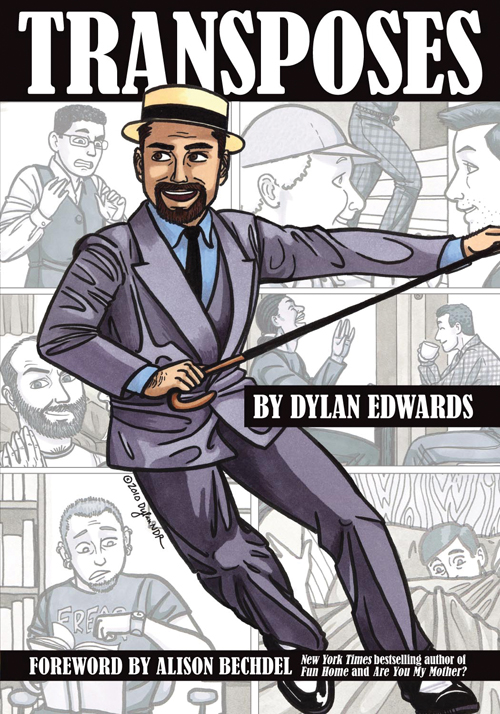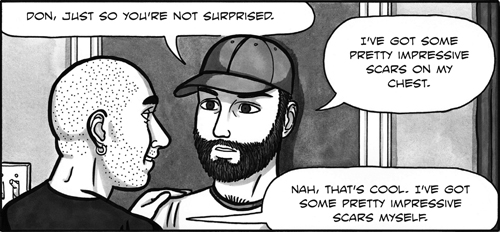
Transposing to the Key of Queer

Cartoonist Dylan Edwards illustrates trans men’s lives
by Neil Ellis Orts
Back in 2009, I first became aware of the work of Dylan Edwards and interviewed him for an OutSmart article on gay comics creators. At that time, he was best known for his gay sports one-panel comic, The Outfield, and his series of mini-comics, Politically InQueerect, but he had just started work on a book about the experiences of trans men who identify as gay.
That book, Transposes, has just been published by Northwest Press, a publisher that specializes in LGBT graphic novels. In six stories about seven trans men (one story is about a long-term couple), Edwards gives us glimpses into lives we might not otherwise be aware of. With a foreword by Alison Bechdel (Fun Home, Are You My Mother?, Dykes to Watch Out For), it’s an auspicious first excursion into book-length publishing.
Neil Ellis Orts: Even though I’ve interviewed you before, I hadn’t realized until I read Transposes that you yourself are trans. Can we talk about that?
I guess. I don’t know—it’s been a little bit of an awkward thing to decide to be public about that. It’s a weird space to navigate, because it’s not exactly the same thing as coming out as queer. If someone doesn’t know you’re gay, then they might assume that you’re straight. They’re reacting to you in a manner that is incorrect. If you’re trans and people don’t know that and perceive you as the gender you intend to be, then they’re reading you correctly, and sometimes coming out as trans can interrupt that and make people think, “Well, now I’m confused.” So there was a lot of hesitation on my part about actually saying, “Yes, I’m a trans comics creator.” At the same time, writing a book like this is kind of begging the question. People want to know what’s my relationship to the material, and if I’m not honest about that, then it’s kind of annoying, or coy, or something. Just say it, you know? Just let it be out there.
I understand you interviewed real people for the stories in Transposes. I assume you talked to more people than are actually in the book.
Actually, not really. I had contacted, I think, eight people about being in the book and one of them declined. Other than that, everyone else participated. But I had not done a project like this before. I had not interviewed somebody and turned that interview into a comic. I emailed everyone a fairly extensive questionnaire, and I did gather far more material than I ended up using. I basically asked them to write their life story, and I picked out one tiny piece of that. And different people answered in different ways. Some people answered by giving me very extensive anecdotes. Like Adam’s story was a compilation of a couple of very detailed anecdotes he gave me. Cal was the same way. Henry actually answered with short bullet points for each thing. Now, if I had to do the interviews again, I would say, “Think of three interesting stories that tell me what it means to be queer and trans, and of those three, I’ll pick the best one.” So structuring something like Henry’s story—you know, there are glimmers of narrative in there, but it’s not really told in a narrative fashion. Part of that got infused into the presentation of his personality.
 Without giving too much information, are these people you’ve met face to face?
Without giving too much information, are these people you’ve met face to face?
I have met them all face to face.
You’re talking about them with their fictional names, so I have to ask if you ever called them by the cartoon names you created for them.
I haven’t done that to them in person, but I have been thinking about one of them [and think], “I have to email so-and-so,” and it’ll come through my head as “I need to email Blake.” And I haven’t really tried to correct that, because I don’t want to be in a situation where I’m giving an interview [about the book] and I let slip out their real name. That would be horrible. It’s just my problem to call them by their real name when I see them in real life or email them.
I will say that one thing that came up that I thought was a kind of an amusing correlation about this whole process of giving them a fake name and then absorbing that fake name is, when you know someone who transitions, you probably knew them by their birth name and you have to get used to calling them by a new name. I don’t think I knew anyone I profiled before they transitioned, but I have known other people [who I knew previously], and they’re like, “Hey, I’m transitioning!” Okay, so now I have to think of you as “new name.” For the people that I profile in the book, it kind of had the same feeling. I’m transitioning them into a fake identity, and now I have to remember their fake identity.
Interesting. You address the privacy issues in your introduction, which I loved. I’ve heard trans friends talk about the inappropriate questions they get, and it’s amazing to me what people feel is okay to ask.
This is something that is actually broadly applicable to any minority group. If you don’t understand what their experience is like, it’s not their obligation to make you understand. They don’t instantly get put on display for your edification. If you want to understand, especially with the Internet, there are an enormous number of tools and resources for any kind of minority whose life doesn’t quite make sense to you. You have a lot of opportunities for educating yourself. And I’ve heard this not just from trans people or gay people, but from people of color who are at a party and someone corners them and says, “Let’s talk about the Black experience.” And it’s like, “Let’s not talk about the Black experience, I’m trying to have fun at a party here.” Jewish or Muslim or whatever—anyone who is kind of outside the “norm” is going to have people who say, “Hey, I need you to educate me.” You need to educate yourself and not necessarily put this person on the spot to be your teacher.
Any final thoughts you’d like OutSmart readers to know about Transposes?
What I hope for is that people who read it and enjoy it will be enthusiastic and tell their friends about it. It is a niche topic coming from a small publisher, so it’s going to be word-of-mouth. And it’s not just for trans people. As we were just saying about having tools and resources, here is a tool or resource for educating yourself about the lives of other people. So I hope a lot of people who are not trans or even gay will pick it up because they want a deeper understanding [of trans life].
Neil Ellis Orts is a frequent contributor to OutSmart magazine.










